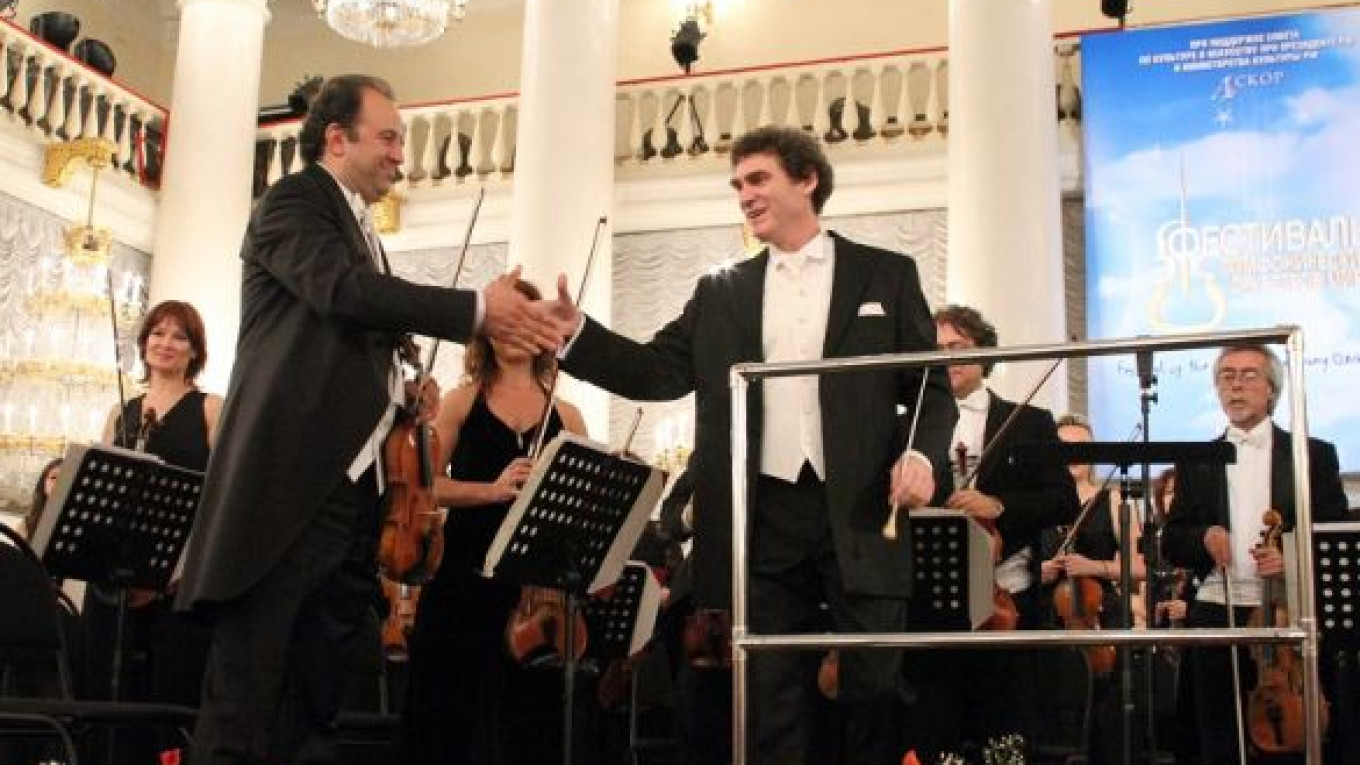With one exception — the Israel Philharmonic — participants in the first four installments of Moscow’s annual Festival of the World’s Symphony Orchestras were drawn exclusively from Russia and countries of the European Union. This year’s fifth installment, which took place June 2-11, turned in a mostly different direction, looking eastward, in the broadest sense, and presenting orchestras from China, India, South Korea and Turkey, together with one from the arguably “eastern” Russian Republic of Tatarstan. Completing the festival roster was Moscow’s own Tchaikovsky Symphony Orchestra.
As in the past, the festival took place in the historic Columned Hall of the House of Unions, an excellent and beautiful venue rarely used these days due to its high cost, but apparently affordable by the festival, with its budget of nearly 90 million rubles ($2.9 million) and funds generously supplied by the Russian presidential administration.
Unfortunately, I was unable to attend the concert of the Presidential Symphony Orchestra of Turkey, which was founded under the Ottoman Empire in 1826 and is one of the world’s oldest symphonic ensembles.
Among the four other “eastern” orchestras, the most outstanding proved to be South Korea’s Seoul Philharmonic, led by world-renowned pianist and conductor Chung Myung-whun. Chung is so far the only maestro to make a repeat appearance at the festival. The very first festival, in 2006, found him at the helm of the Paris-based Orchestre Philharmonique de Radio France, in a concert that I later judged to be the finest I had attended in Moscow that entire year.
Chung’s return with the Seoul orchestra gave further confirmation of his status as one of the world’s top-ranking conductors. Two-thirds of the program consisted of 20th-century French music — a fascinating early work by Olivier Messiaen, Maurice Ravel’s barbed commentary on the decadence of pre-World War I Europe, “La Valse,” and a haunting suite from Claude Debussy’s opera “Pelleas et Melisande.” All were given polished and authentically French-sounding performances.
Also on the program was a pan-Asian novelty, a concerto by Korean composer Unsuk Chin for sheng and orchestra. Originating in China at least 14 to 16 centuries ago, the sheng is a wind instrument of vertical pipes that offers an incredible variety of sounds, some bearing an uncanny resemblance to those of present-day orchestral instruments. Sheng player Wei Wu and the orchestra gave what seemed an accomplished performance of Chin’s lovely score, and the soloist followed it with a virtuosic encore that explored even more fully the sheng’s vast range of sonic possibilities.
The National Symphony Orchestra of China appeared under the baton of veteran French conductor Michel Plasson and delivered crisp, fast-paced readings of Ludwig van Beethoven’s Symphony No. 7 (at a proper allegretto, as marked, not the slower andante unfortunately favored by most conductors) and Camille Saint-Saens’ Symphony No. 3. Both performances were reminiscent of those I recall by one of Plasson’s mentors, the great Alsatian conductor Charles Munch.
Chinese music led off the concert in the form of a section from Guan Xia’s “Requiem for the Earth,” a solemn and moving tribute to the thousands who lost their lives in the Sichuan earthquake of May 2008.
Beethoven’s massive “Choral Symphony,” No. 9, seemed a risky choice for the Symphony Orchestra of India, founded just four years ago on private initiative and India’s first-ever full-scale orchestral ensemble. But the performance it gave at the festival’s final concert was absolutely first-rate, marked by precise playing, full-bodied sound and superb pacing from Russian conductor Alexander Anisimov.
The orchestra, which included quite a few musicians of non-Indian origin, was joined in the last movement of the Beethoven by a chorus that combined a modest-sized group of singers from India with Moscow’s own excellent Sveshnikov Russian Choir and by a quartet of accomplished soloists from the Bolshoi and Mariinsky theaters, notably, the Bolshoi’s Pyotr Migunov, who delivered the lengthy bass solo in splendid voice and authentic-sounding German.
The festival opened with an appearance by the State Symphony Orchestra of Tatarstan, led by Lithuanian maestro Guntaras Rinkevicius, substituting for the orchestra’s gravely ill artistic director, 82-year-old Fuat Mansurov. (Mansurov, who appeared in the audience to a standing ovation, passed away on June 12; his funeral took place on Friday at the Bolshoi, where he regularly conducted for nearly four decades.)
Under Rinkevicius’ baton, the orchestra gave commendable performances of Dmitry Shostakovich’s breezy and relatively brief Symphony No. 9 and an overture by Tatar composer Nazib Zhiganov, but became rather bogged down in the complicated score of Alexander Scriabin’s Symphony No. 2.
The Tchaikovsky Symphony Orchestra, which celebrates its 80th birthday this year, displayed its usual excellence, conductor Alexander Sladkovsky leading it in a bright performance of Nikolai Rimsky-Korsakov’s “Scheherazade” and doing what seemed fair justice to contemporary Russian composer Alexei Rybnikov’s gigantic and intermittently interesting Symphony No. 5, titled “The Resurrection of the Dead.”
A Message from The Moscow Times:
Dear readers,
We are facing unprecedented challenges. Russia's Prosecutor General's Office has designated The Moscow Times as an "undesirable" organization, criminalizing our work and putting our staff at risk of prosecution. This follows our earlier unjust labeling as a "foreign agent."
These actions are direct attempts to silence independent journalism in Russia. The authorities claim our work "discredits the decisions of the Russian leadership." We see things differently: we strive to provide accurate, unbiased reporting on Russia.
We, the journalists of The Moscow Times, refuse to be silenced. But to continue our work, we need your help.
Your support, no matter how small, makes a world of difference. If you can, please support us monthly starting from just $2. It's quick to set up, and every contribution makes a significant impact.
By supporting The Moscow Times, you're defending open, independent journalism in the face of repression. Thank you for standing with us.
Remind me later.


